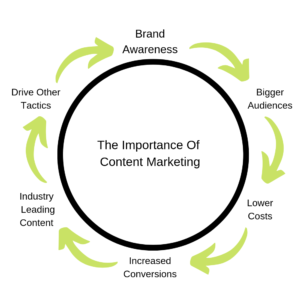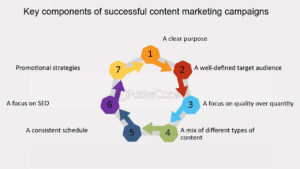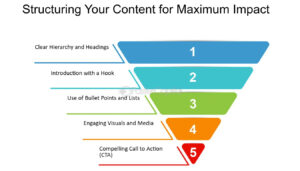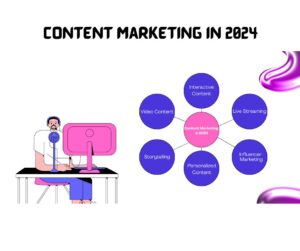
Content Marketing for Maximum Impact
Table of Contents
ToggleHow to Leverage Content Marketing for Maximum Impact

Introduction
In today’s digitally-driven world, where consumers are constantly bombarded with advertisements and promotional messages, traditional marketing tactics are becoming increasingly ineffective. Enter content marketing – a strategic approach that focuses on creating and distributing valuable, relevant, and consistent content to attract and retain a clearly defined audience. When executed effectively, content marketing can not only drive engagement and build brand awareness but also nurture customer relationships and drive revenue growth. In this comprehensive guide, we’ll explore the fundamental principles and actionable strategies to leverage content marketing for maximum impact.
Understanding Content Marketing
At its core, content marketing is about delivering value to your audience. Rather than pushing sales messages, content marketers aim to educate, entertain, or inspire their target audience through informative articles, engaging videos, captivating visuals, and other forms of content. By providing valuable information that addresses the needs and interests of their audience, businesses can establish trust, credibility, and authority in their respective industries.
The Importance of Content Marketing
Content marketing plays a crucial role in modern marketing strategies for several reasons:
- Builds Brand Awareness: By consistently delivering high-quality content, businesses can increase their visibility and reach a wider audience. Valuable content attracts inbound traffic and encourages social sharing, helping to spread brand awareness organically.
- Drives Engagement: Engaging content fosters meaningful interactions with your audience. Whether it’s through blog comments, social media shares, or email responses, content marketing encourages two-way communication, building stronger relationships with customers and prospects.
- Generates Leads: Content marketing is an effective tool for lead generation. By offering valuable resources such as e-books, webinars, or free trials, businesses can capture contact information from interested prospects and nurture them through the sales funnel.
- Supports SEO Efforts: Search engines prioritize content that is relevant, informative, and up-to-date. By consistently publishing fresh and optimized content, businesses can improve their search engine rankings and attract organic traffic to their website.
- Demonstrates Thought Leadership: Through thoughtfully curated content, businesses can showcase their expertise and thought leadership in their industry. By providing valuable insights, analysis, and commentary, businesses can position themselves as trusted advisors to their audience.
Key Components of a Successful Content Marketing Strategy
To leverage content marketing for maximum impact, businesses should consider the following key components:
- Define Your Audience: Start by clearly defining your target audience. Conduct market research to understand their demographics, interests, pain points, and preferences. By creating buyer personas, businesses can tailor their content to resonate with the specific needs and interests of their audience segments.
- Set Clear Objectives: Identify the goals you want to achieve through content marketing. Whether it’s increasing brand awareness, driving website traffic, generating leads, or boosting sales, setting clear objectives will help you measure the effectiveness of your content marketing efforts.
- Develop a Content Strategy: Based on your audience insights and business objectives, develop a comprehensive content strategy. Determine the types of content you will create (e.g., blog posts, videos, infographics), the topics you will cover, and the channels you will use to distribute your content.
- Create High-Quality Content: Content quality is paramount in content marketing. Focus on creating content that is informative, engaging, and valuable to your audience. Invest in professional writing, design, and production to ensure that your content stands out and resonates with your audience.
- Promote Your Content: Don’t rely solely on organic reach to distribute your content. Actively promote your content through various channels, including social media, email marketing, influencer partnerships, and paid advertising. By amplifying your content’s reach, you can attract a larger audience and drive more engagement.
- Measure and Analyze Results: Monitor the performance of your content marketing efforts using key metrics such as website traffic, engagement rates, conversion rates, and social media metrics. Analyze the data to identify what’s working well and what can be improved. Use this insight to refine your content strategy and optimize your future efforts.
Advanced Strategies for Maximum Impact
To take your content marketing efforts to the next level and maximize their impact, consider implementing the following advanced strategies:
- Personalization: Tailor your content to individual audience segments based on their preferences, behaviors, and past interactions with your brand. Use data-driven insights to deliver personalized recommendations, offers, and content recommendations that resonate with each segment.
- Interactive Content: Experiment with interactive content formats such as quizzes, polls, calculators, and interactive infographics. Interactive content not only captures attention but also encourages active engagement and participation from your audience.
- Content Repurposing: Maximize the value of your content by repurposing it into different formats and distributing it across multiple channels. For example, you can turn a blog post into a video, an infographic, or a series of social media posts, reaching different audience segments and extending the lifespan of your content.
- User-Generated Content: Encourage your audience to create and share content related to your brand or products. User-generated content not only provides social proof and authenticity but also fosters a sense of community and belonging among your audience.
- Collaborations and Partnerships: Partner with influencers, industry experts, or complementary brands to co-create content and reach a wider audience. Collaborations allow you to leverage the existing reach and credibility of your partners, increasing the visibility and impact of your content.
Case Studies: Real-World Examples of Effective Content Marketing
1. HubSpot: Inbound Marketing Resources: HubSpot, a leading provider of inbound marketing and sales software, is renowned for its extensive library of educational resources and content. From blog posts and ebooks to webinars and online courses, HubSpot offers a wealth of valuable content for marketers, entrepreneurs, and sales professionals. By providing free resources that address the pain points and challenges of its target audience, HubSpot attracts inbound traffic, generates leads, and nurtures customer relationships, ultimately driving revenue growth.
2. Airbnb: Neighborhood Guides: Airbnb, the popular online marketplace for short-term lodging and vacation rentals, created a series of neighborhood guides to showcase the unique attractions, restaurants, and experiences in cities around the world. By curating local insights and recommendations from Airbnb hosts and community members, the neighborhood guides provide valuable travel inspiration and information for Airbnb guests. This content not only enhances the user experience but also reinforces Airbnb’s brand identity as a platform that enables authentic and immersive travel experiences.
Conclusion
Content marketing has emerged as a powerful strategy for businesses to connect with their audience, build brand awareness, and drive meaningful engagement. By delivering valuable content that resonates with their target audience, businesses can establish trust, credibility, and authority in their industry, ultimately driving revenue growth and long-term success. By following the principles outlined in this guide and implementing advanced strategies to maximize impact, businesses can leverage content marketing as a strategic asset to achieve their marketing objectives and stand out in today’s competitive landscape.
Meta Description:
Content Marketing Unlock the potential for your business. Learn strategies to drive engagement, build brand awareness, and boost ROI.
Three FAQs:
1. What is content marketing?
Content marketing is a strategic approach focused on creating and distributing valuable, relevant, and consistent content to attract and retain a clearly defined audience. It involves delivering information, entertainment, or inspiration to engage with the target audience and build brand awareness.
2. Why is content marketing important?
Content marketing is important because it allows businesses to connect with their audience in a meaningful way. By providing valuable content, businesses can establish trust, credibility, and authority in their industry, drive engagement, generate leads, and ultimately, drive revenue growth.
3. How can businesses leverage content marketing effectively?
To leverage content marketing effectively, businesses should start by defining their target audience and setting clear objectives. They should develop a comprehensive content strategy, create high-quality content, promote it through various channels, and measure its performance. Additionally, businesses can implement advanced strategies such as personalization, interactive content, and collaborations to maximize the impact of their content marketing efforts.




